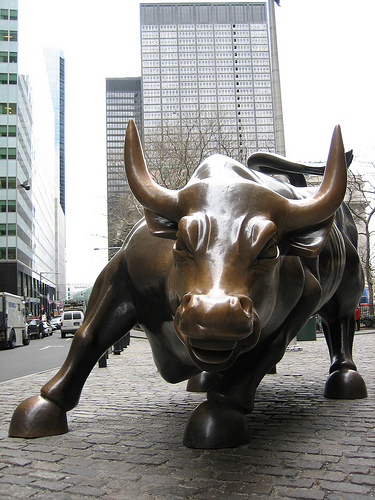President Obama rolled out his much anticipated big-bank tax today, dubbed the “Financial Crisis Responsibility Fee.” The fee will go into effect on June 30, and the White House projects the tax to generate $90 billion over 10 years and $117 billion over 12 years—but either way, the tax won’t go away until the TARP bailout money for these big institutions is repaid in full. It’ll apply to the largest financial institutions—technically, those with more than $50 billion in consolidated assets—and that includes bank-holding companies (i.e., Goldman Sachs), thrifts, and insurance companies (i.e., AIG). Not subject to the tax are Fannie Mae and Freddie Mac and the US automakers, even they all received more than generous rescue packages from the government.
Not surprisingly, Wall Street is clearly pissed at this oh-so-subtly named fee. In announcing it today, Obama responded to the financial sector’s criticism with a direct message to Wall Street executives. “Instead of sending a phalanx of lobbyists to fight this proposal or employing an army of lawyers and accountants to help evade the fee,” he said, “I suggest you might want to consider simply meeting your responsibilities.” Fat chance of that. The head of the Financial Services Roundtable, one of the biggest coalitions of financial interests that frequently lobbies on financial issues on Capitol Hill, already came out swinging, calling the tax a “strictly political” move.
So what? From a political standpoint, Obama’s record so far has been so skewed in favor of Wall Street and the financial industry, while taxpayer-directed efforts like the Making Home Affordable program have floundered and done little to abate the foreclosure crisis (which, mind you, remained at record levels in 2009 and is only getting worse in 2010), that it’s about time Obama took a political stand that suggested otherwise.
That said, the tax does smell of an ad hoc solution, and feels like a move intended more to pacify anger toward Wall Street’s “fat cats” and their bonuses and bailouts than to recoup bailout money. I also fear that the cost of the tax could be passed along to consumers, who are supposed to be the winners in this deal. Matt Yglesias says if that’s the case, then consumers will simply spend less and take their money elsewhere; my only fear with that, however, is that if most of the big supermarket banks are included here, there aren’t many options for consumers who want to take their business to another bank, unless they’re willing to move to a smaller, probably regional bank. Which perhaps isn’t so bad after all.
The tax, to be sure, is no substitute for better capital requirements and more rigorous regulation, and it shouldn’t distract anyone from the more important goal of passing tough, smart financial regulation this year.
















